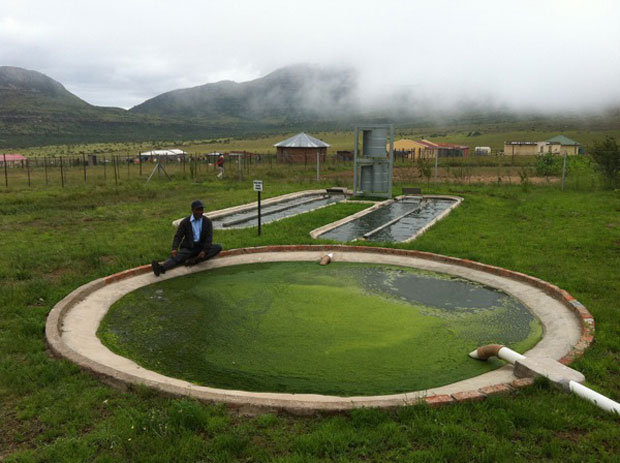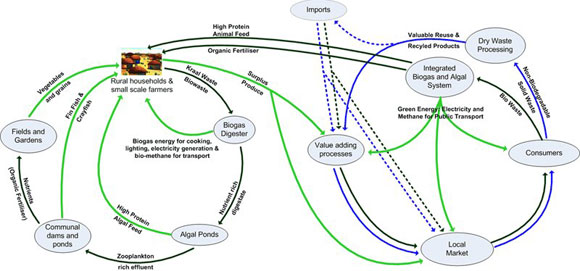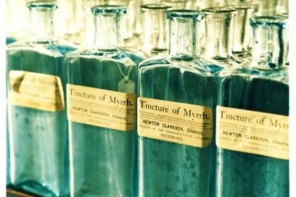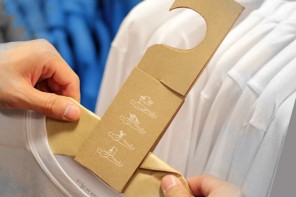Did you know that waste can be converted into energy? Peoples Power Africa are using bio-digester technologies to set up dignified sanitation systems at rural schools in the Eastern Cape; not only do these systems work to recycle and sterilise waste water, but they produce valuable by-products such as cooking gas and fertiliser.
“A bio-digester is basically a big bacteria beer,” explains Mark Wells, a qualified industrial engineer who is very involved with these projects. “It allows the right circumstances for the algae kingdom to convert the waste into something more useful.”
Their successful prototype, set up at Three Crowns School in the Lady Frere District, is made up of both a sanitation bio-digester and an agricultural bio-digester. While the sanitation bio-digester works to create methane gas from the schools sewerage waste – after which it is sent to an algae pond for sterilisation treatment, creating a rich pathogen-free algal fertiliser in the process – the agricultural bio-digester is capable of creating much more methane gas from garden waste such as grass cuttings, manure and organic waste from the kitchen (however as there is no algae pond involved, there is no fertiliser created).
The biogas is used as part of the schools nutrition programme, something which would have had to have been purchased otherwise at a cost. The algae pond also works to sterilise and recycle much of the water used as part of the toilet system.
“The state of our school was very bad,” explains principle Nosipho Thobeko- Dokolwana. “We had pit toilets which were smelly and attracted many flies.”
The pits she speaks of are part of a government roll-out that consists of a big hole that is dug and then used as the place where students must relieve themselves.
“I personally would not use them,” says Mark Wells. “There is no flush and they smell pretty disgusting, plus they rely on being emptied from time to time. The bio-digester system allows for dignified sanitation, while potentially paying for itself over time.”
A man with many years’ experience working on sustainable, ‘zero waste’ designs, Mark believes that they have now managed to create a fool-proof system that can benefit rural schools in a number of ways. The idea is that schools could save money by using the fertiliser to cultivate a vegetable garden and the carbon-neutral biogas to cook the students’ meals – even selling the surplus gas and food for profit. They are currently looking at a way that this system could even encourage job creation; for example gardeners and caretakers.
Another great aspect of this project is the education opportunity. Students from a very young age can start to understand biological processes, using the bio-digester as a kind of ‘laboratory’ where they can explore and make use of the wonders of bio chemistry.
Working with a technology that was studied at Rhodes University for 12 years and the rights to which have since been bought by South Africa government, this system is not only low maintenance but is also easy to run and produces results in under no time at all.
“It really is not tricky to understand the bio-digester system; it compares to basic plumbing,” explains Mark. “After a month it starts producing gas – and this is when the magic begins! We are helping to change people’s perspective on waste, to better understand the natural kingdom. “
While this project currently has the support of the Eastern Cape premier, Mrs Keviet, and has won numerous awards including the Climate Action Showcase Project for province, it is yet to be recognised and given the’ go ahead’ by national government. See the Three Crowns biodigester for yourself: click here to watch the video!
Image via here











